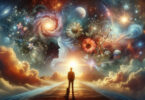Guest writer for Wake Up World
A few years ago, two young smartly-dressed Mormon gentlemen approached me outside my local library. ‘Excuse me sir,’ they said to me. ‘I was wondering if you ever read the Bible?’
I was with my baby son and he needed to get home for his lunch, so I decided to be blunt and direct. I told them that I didn’t and decided to try out what I consider to be two of the best arguments against religion.
‘There are thousands of different religions in the world, all of them with different beliefs,’ I told them. ‘And every single one of them believes that they have the truth and everyone else’s beliefs are false. So that must mean that none of them have the truth. Or think of it like this: where do your beliefs come from? They were passed down to you from your parents. You didn’t search them out and evaluate them yourselves, they were passed on to you, and you’ve never questioned them.’
“That’s not correct,’ one the Mormon guys replied politely. “Our parents didn’t force their beliefs on us, we were offered them. When I was old enough, I did think about them–and I came to the conclusion that they were right.”
I could tell by their expressions that my arguments hadn’t had any effect. In fact, I knew they wouldn’t have any effect since I have long concluded that it’s impossible to use the power of reason in debates about religion.
In my view, there are two factors involved. Once beliefs are deeply ingrained inside the human psyche–particularly during childhood–they are very difficult to dislodge. And secondly, religious belief systems satisfy powerful psychological needs, which are difficult to meet in other ways.
The Origins of Religion
Have human beings always been religious? It depends on what you mean by ‘religion.’ There is evidence that earlier human beings (and many of the world’s indigenous peoples) were not religious in the sense we normally understand it. As I point out in my book The Fall most indigenous groups–at least before colonization and conquest–did not have concepts of gods who looked over the world and intervened in human affairs. Rather, indigenous groups tend to be animistic or pantheistic. They tend to conceive of an impersonal spiritual force which pervades all things (a good example of this is the concept of a ‘Great Spirit’ or ‘Great Mystery’ conceived of by some Native American groups). At the same time, they usually believe in individual “spirits” (which are conceived of as vapors or forces, rather as personal beings) that inhabit the world around them.
Religion as we know it seems to be associated with the development of agriculture, and of the first settlements. It also seems to be linked to what we normally think of as ‘civilization’ – technological advances, hierarchical social arrangements, and warfare. Since then, however, religion has been indelibly linked with human societies. From polytheistic societies such as the ancient Sumerians and Egyptians and the ancient Greeks and Romans to the ‘Abrahamic’ religions of Judaism, Christianity and Islam.
So why did religion come into being? Some evolutionary psychologists suggest that religion has been ‘selected’ as a trait by evolution because it has survival value – it creates social cohesion and group identity. This seems feasible, but the fact that earlier human groups didn’t have religion in the normal sense of the term seems to undermine the argument.
Another theory is that religion was necessary because of its explanatory function. In the absence of scientific understanding, religions offered ways of explaining the workings of nature and the random events of human life. It wasn’t possible to explain how the world came into being, or how living beings evolved, so it was necessary to believe that God created everything. Death and illness could be caused by the will of God; winds and storms could be caused weather gods.
Some atheists have predicted the ‘end of religion.’ They believe that now that science has offered more rational explanations of the world, religion is no longer necessary. In theory, at least, human beings should be able to dispense with supernatural explanations. This also fits with the idea that religion is a kind of ‘virus’ which infects people’s mind, spreading to children from their parents, and to individuals via their larger community. According to this, we might be able to wipe out the virus of religion through education and exposure to scientific facts.
Ego-Isolation and Religion
But these views are naive. The reason why religion seems to be holding fast – and even becoming more popular in some parts of the world–is because it has an important psychological function. In my view, the need for religions is the result of what I call ‘ego-isolation.’ This is a sense of separateness from the world and other human beings, a feeling of being an entity enclosed within your own mental space, with the rest of the world ‘out there,’ on the other side.
Ego-isolation (or ego-separateness) is such a normal part of our experience as human beings that we don’t normally conceive of any other way of being. But there is a great deal of evidence that earlier human beings–and many of the world’s indigenous groups–did not experience this sense of separation. In fact, this is the very reason why they didn’t have religions – because psychologically, they didn’t need them. (See The Fall for further details.) We also occasionally experience different states of consciousness, in which our sense of separation falls away, and we experience a sense of connection (or even oneness) with other human beings, with nature or the whole universe. This experience of transcending separateness is one of the main facets of what I call ‘awakening experiences.’
Religions are important because they help us to deal with our sense of separateness. The concept of God as an anthropomorphic entity who oversees the world and controls the events of our lives convinces us that we are never really alone. The concept of God provides a comforting sense of communion, which helps to alleviate our sense of isolation.
Religion also provides a powerful sense of group identity and a sense of belonging, which helps to alleviate our ego-isolation. We subsume our own identity into our group, and so feel that we are no longer isolated individuals. Apart from ethnic identity, religion is probably human beings’ biggest source of group identity–and group conflict. Often, of course, ethnic and religious identities are tied together, as in the cases of Irish Protestants and Irish Catholics, and Bosnian Muslims and Serbian Christians. One reinforces the other and makes the potential for conflict even greater.
The concept of an afterlife is also an important part of the appeal of religions, of course. Indigenous peoples have beliefs in an afterlife too, but they generally don’t conceive of the afterlife as heaven or paradise, where their every need will be met and they’ll exist in a state of bliss for all eternity. Many peoples believe that in the next world they’ll just go on living in much the same way as in this life, only as a shade or spirit. Others have a more spiritual conception of death, seeing it as a time when our individual spirit merges back into Spirit as a whole, or when we return to the womb of the Earth.
However, because ego-isolation creates a basic sense of psychological suffering–and because many human beings’ lives have been full of the social suffering of oppression and conflict–the afterlife became an idyllic place which could compensate us for the privations of life on Earth. It became a kind of collective pipe dream which helped us to endure the misery of the present. Particularly for our ancestors from a few centuries ago–whose lives were ‘nasty, brutish and short’ as peasants, serfs or slaves–to believe in an idyllic afterlife was a psychological necessity, without which life would have seemed a cruel and meaningless joke.
Transcending Religion
While ego-isolation exists, no amount of rationality or education will persuade the human race to move beyond religion. Ultimately, the only way that human beings will transcend religion is by transcending ego-separateness.
And in actual fact, human beings have been practicing methods of transcending separateness throughout history. This is the essential aim of spiritual practices such as meditation, and spiritual paths such as Buddhism, Yoga and Taoism. Even within traditional religions such as Christianity, Islam and Judaism, there have always been mystical traditions whose aim is to transcend individuality and attain oneness with God. Through following spiritual paths and practices, the boundaries of the ego become soft and fluid, and we gain a sense of connection to other human beings, to nature and the world as a whole. This is why spiritual development is often associated with increased compassion and altruism, which arise naturally from an increased sense of connection with other human beings.
Although they are often associated with each other, religion and spirituality actually have two different aims. While the goal of religion is to support and console the ego, the true goal of spirituality is to transcend the ego. (It’s true that most religions–in their purest form–do have a spiritual element to them too, but many religious people ignore this in favor of the ego-supporting aspects of religion.)
Ultimately, therefore, the only way in which the human race will ever transcend religion is through transcending ego-separateness.
Originally published at Psychology Today and reproduced with permission.
Recommended articles by Steve Taylor, Ph.D:
- Do Psi Phenomena Exist? A Debate (Part One)
- Do Psi Phenomena Exist? The Debate Continues
- David Ditchfield’s Remarkable Near Death Experience
- Waking Up – Are Spiritual Experiences Becoming More Common?
- The Guru Syndrome: When Spirituality Turns Sour
- Can Suffering Make Us Stronger?
- Transformation Through Dying: The Aftermath of Near Death Experiences
- Elation: The Amazing Effect of Witnessing Acts of Kindness
- The Power of Forgiveness: The Transformational Effect of Letting Go of Resentment
- The Power Of Silence
About the author:
Steve Taylor is a senior lecturer in Psychology at Leeds Beckett University, UK. His latest books in the US are The Calm Center and Back to Sanity: Healing the Madness of the Human Mind. He is also the author of The Fall, Waking From Sleep, and Out Of The Darkness. His books have been published in 19 languages. His research has appeared in The Journal of Transpersonal Psychology, The Journal of Consciousness Studies, The Transpersonal Psychology Review, The International Journal of Transpersonal Studies, as well as the popular media in the UK, including on BBC World TV, The Guardian, and The Independent.
Connect with Steve at StevenMTaylor.com.

If you've ever found value in our articles, we'd greatly appreciate your support by purchasing Mindful Meditation Techniques for Kids - A Practical Guide for Adults to Empower Kids with the Gift of Inner Peace and Resilience for Life.
In the spirit of mindfulness, we encourage you to choose the paperback version. Delve into its pages away from screen glare and notifications, allowing yourself to fully immerse in the transformative practices within. The physical book enriches the learning process and serves as a tangible commitment to mindfulness, easily shared among family and friends.
Over the past few years, Wake Up World has faced significant online censorship, impacting our financial ability to stay online. Instead of soliciting donations, we're exploring win-win solutions with our readers to remain financially viable. Moving into book publishing, we hope to secure ongoing funds to continue our mission. With over 8,500 articles published in the past 13 years, we are committed to keeping our content free and accessible to everyone, without resorting to a paywall.








